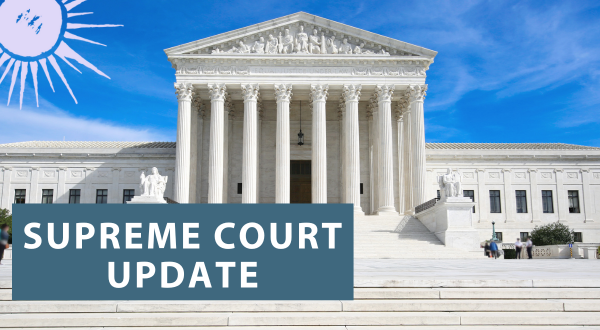
A Surprise Win for Voting Rights
JoAnn Goedert, Ignatian Volunteer Corp Member
Government Relations Special Contributor
June 16, 2023
Since the 2013 Supreme Court decision, Shelby v. Holder, voting rights have eroded steadily in the U.S., especially in Black, Brown, and Indigenous communities — often in southern or red states — where suppression efforts by state legislators have created obstacles to the fundamental right to vote. Making matters worse, neither Congress nor the courts have put a stop to these dangerous threats to our democracy. That is, until a recent Supreme Court decision. Allen v. Milligan is a surprise win for voting rights and our democracy.
Allen v. Milligan is a surprise win for voting rights
The Supreme Court’s decision in Allen v. Milligan stunned legal experts and voting rights advocates. In a 5-4 decision, the Court affirmed lower court rulings that the Alabama state legislature violated the Voting Rights Act (VRA) when it brazenly redistricted the state’s congressional districts in 2021. Section 2 of the VRA bars measures that result in racial minorities having “less opportunity than other members of the electorate to participate in the political process and to elect representatives of their choice.” The Alabama legislature violated Section 2 with a redistricting scheme that ensured that only one Black representative would be elected in the state’s seven Congressional districts—despite the fact that Alabama’s electorate is approximately 27% Black.
Why were observers surprised? In the narrow Court finding, Chief Justice Roberts and Justice Kavanaugh (conservatives) joined more Justices Sotomayor, Kagan and Jackson (liberal). It was unexpected because Supreme Court decisions on the Voting Rights Act in the last decade have cut back harshly on the VRA’s effectiveness, and recent statements by various Justices suggested willingness to further, if not decisively, diminish its protections for voters of color.
The Erosion of the Voting Rights Act
In 2013, the Court dealt a severe blow to the VRA. In Shelby v. Holder, the Court struck down the preclearance requirement in Section 4 the VRA that required states with a history of voter discrimination to get the approval of the Justice Department or the federal court before making any election law changes. By ending this scrutiny, the Court eliminated that the VRA’s most effective tool for protecting voting rights in states with a history of voter suppression and intimidation. Later Supreme Court decisions in 2018 and 2021 allowed further state incursions into voting rights.
With the completion of the 2020 census seven years after the Shelby decision, redistricting efforts began in states across the nation. Some southern states–now freed from Justice Department scrutiny—reverted to Congressional district line drawing (gerrymandering) that dramatically diluted the influence of Black voters. Alabama was a prime example, where the legislature redistricted the State to reduce the number of districts with Black majorities from two to just one. In Louisiana, the legislature’s redistricting plan all but guarantees that the State will only have on Black member of Congress from its six districts—despite that fact that over a third of its electorate is Black.
Future Impact of Allen v. Milligan
Last week’s decision means that Alabama must now redraw its congressional map consistent with the Supreme Court’s reasoning and in a manner that almost surely establishes two majority-Black congressional districts. But the decision’s impact will not stop there. At a minimum, it will reverberate to other states with a history of voter discrimination where post-2020 census redistricting schemes have diluted Black representation. Litigation alleging violations of Section 2 of the VRA is already ongoing in Louisiana, Texas, Arkansas, and Georgia, challenging the recent redistricting of those states’ Congressional maps, and the outcomes of these cases will now be subject to the Supreme Court’s new ruling.
As a result, political forecasters predict that Black and Brown voters will now play a substantial role in electing the next Congress member in a minimum or two, and possibly four or five, districts where their votes were marginalized by Republican-controlled redistricting schemes. With control over the House of Representatives decided by narrow margins in the last two elections, the impact of even a few seats changing hands may be decisive.
The Allen v. Milligan decision will extend beyond Congressional races to state elections as well. The VRA applies to the election of state legislatures, elected judges, and even some local races. For example, there is already active litigation challenging state legislature maps under Section 2 in Georgia, Mississippi, Louisiana, North Dakota, and Alabama. Similar cases have been filed challenging:
- A redistricting plan for the Galveston County, Texas Commissioners Court
- The Georgia Public Service Commission, and
- The Mississippi and Louisiana State Supreme Courts.
While Allen v. Miller signals renewed respect for minority voting rights, it may take time for its impact to be felt widely. It depends on the length of time it takes for cases to wind through federal courts (this can take months) and the time in which new cases are filed. Nonetheless, in a time when the erosion of voting rights has been a striking and tragic trend, the court’s decision in Allen v. Milligan is a rare but crucial victory for democracy.










